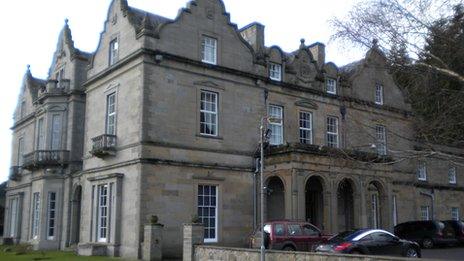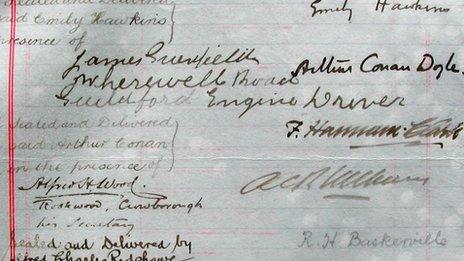Powys hotel's Sherlock Holmes Hound of the Baskervilles link
- Published

The owner of Baskerville Hall Hotel says the family who built the property knew Holmes author Sir Arthur Conan Doyle
It is a mystery even Sherlock Holmes might have had a problem solving.
Who and what inspired Sir Arthur Conan Doyle's The Hound of the Baskervilles?
With Holmes enjoying a resurgence thanks to the BBC Wales-produced primetime TV drama Sherlock, and director Guy Ritchie releasing the second cinema adaptation, interest in the sleuth is soaring.
The origin of one of his most famous cases is disputed, with disagreements about how the novel came about.
But the owner of a hotel in Clyro, near Hay-on-Wye, Powys, claims his 19th Century property was the inspiration for Scottish author Conan Doyle's fictional Baskerville Hall.
David Hodby, who has owned Grade II-star listed Baskerville Hall Hotel since 1984, tells an interesting tale.
There is evidence that Conan Doyle might have known the Baskervilles.
The author's signature appears along with that of an R H Baskerville, believed to be Ralph Hopton Baskerville who inherited the family estate in 1905, on a document held by Powys council's archives department.
The paperwork is apparently in connection with the sale of two farms to R H Baskerville in the old county of Radnorshire in 1907.
Formerly known as Clyro Court, Mr Hodby's property was the family seat of the Baskervilles from 1839 until 1945, when it was sold to the local council and converted into a school.
Mr Hodby claims Conan Doyle was a friend of the Baskerville family, and was a regular visitor to their home.
The Hound of the Baskervilles is probably the most famous of Conan Doyle's stories about his sleuth, and is mainly set on Dartmoor, Devon.
In the story, the old and noble Baskerville family is threatened by the curse of a large black beast who terrorises and kills any family member who comes to live on the Baskerville estate.

The document held by Powys council archives department shows Arthur Conan Doyle and RH Baskerville's signatures
But the story behind the detective's most famous case is almost as shrouded in fog as the tale itself, with some claiming that the fictional Baskerville Hall and legends of killer hounds come from Dartmoor and Devon.
Mr Hodby said Conan Doyle's story was based on the hounds of Black Vaughan which, as local legend has it, roamed the moors of nearby Hergest Ridge.
'Ward off tourists'
"Arthur Conan Doyle was a family friend who often came to stay here," Mr Hodby said.
"During his many visits he learned of the local legend, the Hounds of Black Vaughan, on nearby Hergest Ridge.
"The hounds were owned by the Vaughan family who ran an estate and the dogs were often set on walkers, some of whom died running from the dogs.
"That's how the legend started and Conan Doyle would have known this."
Mr Hodby added: "However, at the request of the Baskervilles he (Conan Doyle) set his famous novel in Devon to ward off tourists."
Mr Hodby said like the fictional Baskervilles, the Baskervilles of Clyro were of noble birth and were descended from the Dukes of Normandy.
But author Alistair Duncan, who has written four books about Sherlock Holmes and Conan Doyle, cast doubt on Mr Hodby's claims, although he did not dismiss them.
"There are hound legends in that area, but there are so many around the country," he said.
"I'm not saying the (Hergest Ridge) legend wasn't a contributory factor to Conan Doyle's story, but it's widely accepted that the credit goes to a journalist, Bertram Fletcher Robinson, who told Conan Doyle about the hound legends in Devon.
"As for the Baskerville name, Bertram Fletcher Robinson had a coachman called Henry Baskerville (one of the characters in the book).
"When the book was published Robinson gave a copy to his coachman which had an inscription apologising for using his name."
Mr Duncan said Conan Doyle's first wife, Louisa, had links to Wales and could have influenced him with stories of Hergest Ridge.
"Conan Doyle's diaries are widely available and they show he did not visit Wales when he was writing the story, but he was in Devon and Norfolk," he added.
But a recently published book by Margaret Newman Turner, from Presteigne, Powys, suggests the Hergest Ridge hound legend was the inspiration for Conan Doyle's story.
- Published18 January 2012
- Published16 January 2012
- Published22 December 2011